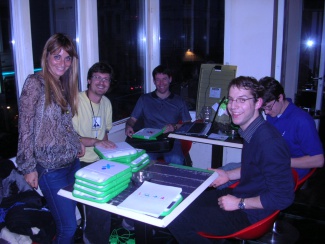Cape Verde
Congratulations SIDS: 2014 is the UN International Year for Small Island Developing States - SIDS !
- Read all about it at http://www.sids2014.org
- Remember: 2008–2017 Second United Nations Decade for the Eradication of Poverty
- Remember: 2005-2014 Second International Decade of the World's Indigenous People (2005-2014)
- Remember: The 2012 theme: "Indigenous Media, Empowering Indigenous Voices", a topic to which OLPC aligns closely.
- The priority areas, chosen by the SIDS
The viewpoints expressed hereunder do not necessarily reflect the opinion of OLPC.
This page was created by a member of the free volunteer community supporting OLPC.
Benvenuo - Welcome - Bienvenu
| Country Information | |
| ISO Country Code | CV |
| Wikipedia Article | Verde Wikipedia Link |
| Government Support | Low and not OLPC Priority |
| Deployment | Demonstration (under 50 machines) |
| Languages | |
| Keyboard Layout | Pls insert correct data |
| Written | Flemish/Vlaams (Vl), Pls insert correct data |
| Spoken | Flemish/Vlaams (Vl), Pls insert correct data |
| Secondary Written | Flemish/Vlaams (Vl), Pls insert correct data |
| Secondary Spoken | Pls insert correct data |
... and thanks for visiting the "OLPC" related Wiki-Pages, for the One Laptop Per Child Universal Primary Education project for Cape Verde. This website is a collaborative website in which you can create a login and then edit and add the pages. This tool is made available by the One Laptop Per Child not for profit. This is an "Open Community" project, similar to the Wikipedia, wikibooks and Open Source Community projects, like Linux, OpenOffice, etc. and it is working along Agenda 21 and Millennium Development Goal nr.2: Bringing Universal Primary Education. To edit text on this page or add pages, log in and and "edit page / save page" button will appear.
- 2' video - OLPC Intro part 1
- 2' video - OLPC Intro part 2
- 7' video: Impact on teachers, parents, kids, society.
The aim of this educational project, is on one hand to bring Universal Primary Education by 2015 as - anno year 2000 initiated - United Nations Millennium Development Goal nr.2. On the other hand, OLPC's mission is to manage the open hard and software project, to bring forward the best possible laptop combination for education: the XO-XServer combination. For this and above approach, - and also a lot of lobbying by the right persons on the right places and time - the United Nations is a Partner in this Open Community project! It is the largest educational project undertaken by Humanity ever, and deemed by many as one of the most inspiring projects out there. 2008, saw the first countries with a 100% roll out to all of their kids aged 5 till 15: Peru, Uruguay. Several Island States have a 100% deployment too; Rwanda, Australia, Cameroon are following at fast pace too. Every XO can load over 100 ebooks on its memory and has a choice of over 86.000 eBooks available, as well as many (educational) games, all education disciplines covered, etc. etc.. things are moving fast indeed.
The country has an estimated population (most of them creole) of about 500,000, with its capital city Praia accounting for a quarter of its citizens. Nearly 38% of the population lives in rural areas according to the 2010 Cape Verdean census. The literacy rate is around 85%. Politically, the country is a very stable democracy, with notable economic growth and improvements of living conditions despite its lack of natural resources, and has garnered international recognition by other countries and international organizations, which often provide development aid. Since 2007, Cape Verde has been classified as a developing nation.
Tough economic times during the last decades of its colonization and the first years of Cape Verde's independence led many to emigrate to Europe, the Americas and other African countries. This emigration was so significant that the number of Cape Verdeans and their descendants living abroad currently exceeds the population of Cape Verde itself. Historically, the influx of remittances from these emigrant communities to their families has provided a substantial contribution to help strengthen the country's economy. Currently, the Cape Verdean economy is mostly service-oriented with a growing focus on tourism and foreign investment, which benefits from the islands' warm climate throughout the year, diverse landscape and cultural wealth, especially in music.
This country has a very multi-cultural society with a very diverse diaspora. We hope that this diaspora will work their way to these pages and that society in Belgium will benefit from these citizens with one leg in Belgium and another still in their countries of origin to develop leadership for OLPC, Agenda 21, the MDG's and accelerate bringing the level that our planet can be a nice place for all humans to new and inspiring heights for generations to come.
Please feel free to create sub-categories or list or start collaborating, teaming up and expanding our and your projects, existing and new ones in one of these sub-categories:


